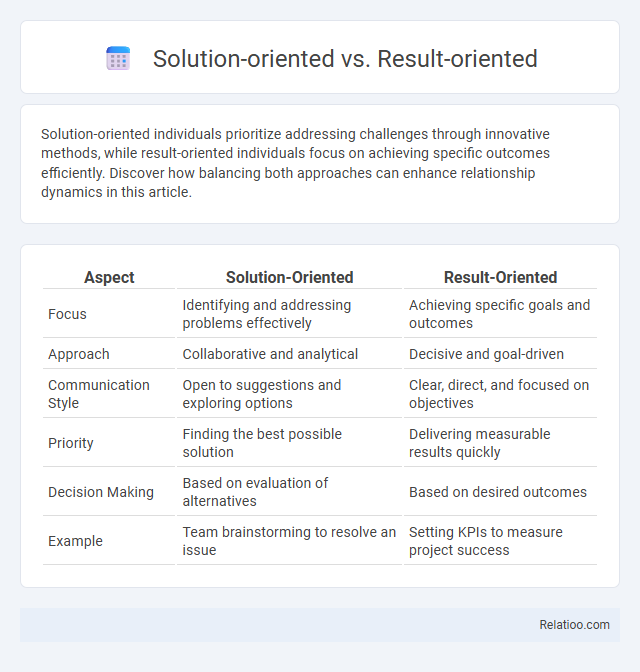Solution-oriented individuals prioritize addressing challenges through innovative methods, while result-oriented individuals focus on achieving specific outcomes efficiently. Discover how balancing both approaches can enhance relationship dynamics in this article.
Table of Comparison
| Aspect | Solution-Oriented | Result-Oriented |
|---|---|---|
| Focus | Identifying and addressing problems effectively | Achieving specific goals and outcomes |
| Approach | Collaborative and analytical | Decisive and goal-driven |
| Communication Style | Open to suggestions and exploring options | Clear, direct, and focused on objectives |
| Priority | Finding the best possible solution | Delivering measurable results quickly |
| Decision Making | Based on evaluation of alternatives | Based on desired outcomes |
| Example | Team brainstorming to resolve an issue | Setting KPIs to measure project success |
Understanding Solution-Oriented Mindsets
You can enhance problem-solving skills by adopting a solution-oriented mindset, which emphasizes identifying effective strategies rather than just focusing on the outcomes. A result-oriented mindset prioritizes achieving specific goals, often assessing success through measurable performance metrics. Understanding the differences helps tailor your approach to challenges, balancing proactive problem resolution with clear objective attainment.
Defining Result-Oriented Approaches
Result-oriented approaches prioritize achieving specific, measurable outcomes by setting clear goals and tracking performance metrics to ensure success. Your strategy focuses on delivering tangible results through efficient resource management and continuous evaluation of progress toward target objectives. This approach contrasts with solution-oriented methods that emphasize identifying and addressing problems without necessarily defining the ultimate outcomes.
Key Differences Between Solution-Oriented and Result-Oriented
Solution-oriented approaches prioritize identifying and implementing effective methods to overcome challenges, emphasizing creativity and problem-solving techniques. Result-oriented strategies focus on achieving specific outcomes and measurable success, driving efforts toward clearly defined goals. Your understanding of these key differences enables targeted decision-making, ensuring the best approach aligns with your project's needs.
Benefits of Being Solution-Oriented
Being solution-oriented enhances problem-solving skills by encouraging a proactive approach to challenges, leading to increased efficiency and innovation in the workplace. This mindset fosters resilience and adaptability, allowing individuals and teams to overcome obstacles without becoming stalled by setbacks. Emphasizing solutions rather than problems improves collaboration and drives continuous improvement, ultimately contributing to sustained success and goal achievement.
Advantages of Result-Oriented Thinking
Result-oriented thinking prioritizes measurable outcomes, ensuring your efforts directly contribute to achieving specific goals and enhancing productivity. This approach fosters accountability and strategic decision-making, driving consistent progress and clear performance evaluation. By concentrating on results, you can optimize resource allocation and maintain a strong focus on impactful solutions.
When to Apply Solution-Oriented Strategies
Solution-oriented strategies excel in complex problem-solving scenarios where identifying effective methods is critical to overcoming obstacles. Apply solution-oriented approaches when issues require creative thinking, collaboration, and adaptive techniques before measuring outcomes. This focus enables organizations to develop innovative processes that address root causes, setting the stage for eventual result-oriented evaluations.
Situations Best Suited for Result-Oriented Focus
Result-oriented approaches excel in situations requiring clear, measurable outcomes and tight deadlines, such as project management and sales targets. This focus drives teams to prioritize efficiency and achievement of specific goals, ensuring accountability and performance tracking. Industries like manufacturing, finance, and technology benefit greatly from a result-oriented mindset where success is defined by tangible results and key performance indicators (KPIs).
Potential Drawbacks of Each Approach
Solution-oriented approaches may overlook measurable outcomes, leading to efforts that lack clear impact, while result-oriented strategies risk sacrificing innovation by prioritizing targets over effective problem-solving. Process-oriented methods can become rigid, limiting adaptability and slowing progress as adherence to procedures takes precedence. Understanding these potential drawbacks helps Your team balance flexibility, outcome focus, and innovative solutions for optimal performance.
Combining Solution-Oriented and Result-Oriented Methods
Combining solution-oriented and result-oriented methods enhances problem-solving by integrating creative approaches with clear goal-setting, promoting both innovation and efficiency. Solution-oriented strategies drive identifying actionable steps and overcoming obstacles, while result-oriented methods emphasize measurable outcomes and accountability in execution. This synergy optimizes project management and decision-making, leading to sustainable success and continuous improvement.
Choosing the Right Approach for Maximum Impact
Choosing the right approach--solution-oriented, result-oriented, or process-oriented--depends on the specific goals and context of a project or challenge. A solution-oriented focus prioritizes identifying effective methods to address problems, while result-oriented emphasizes achieving measurable outcomes and key performance indicators (KPIs). Process-oriented strategies ensure that workflows and procedures are optimized, providing a systematic path to sustainable success and continuous improvement.

Infographic: Solution-oriented vs Result-oriented
 relatioo.com
relatioo.com